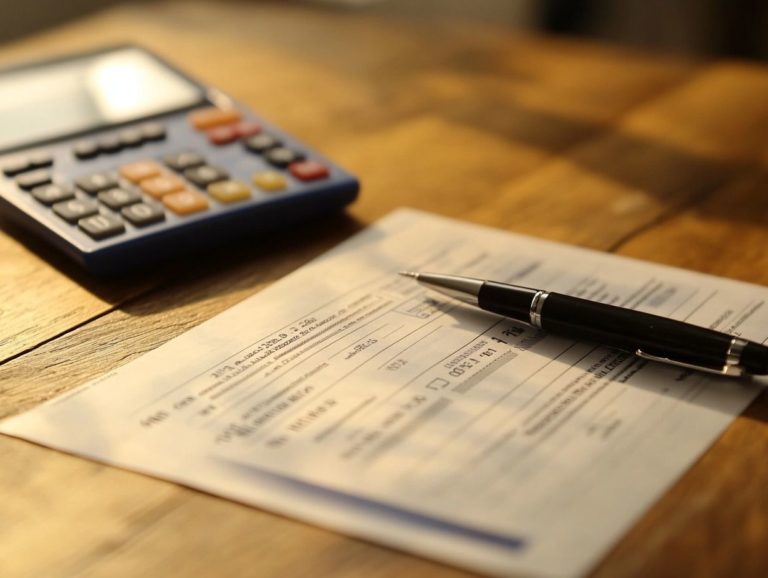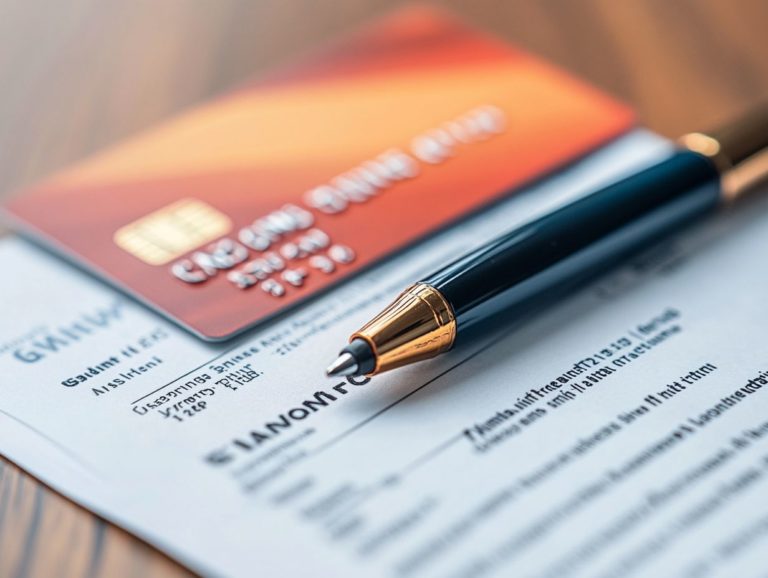How to Handle Credit Card Declines?
Credit card declines can certainly be exasperating, often happening when you least expect it. Grasping the common reasons behind these declines is crucial for navigating the situation with confidence.
This article delves into the various factors that may lead to your card being declined. It also provides practical tips on immediate actions you can take to fix the issue, prevent future declines, combat potential fraud, and help you reclaim your credit standing.
From minor errors to significant concerns, you ll discover valuable insights here to manage the situation effectively.
Contents
- Key Takeaways:
- Understanding Credit Card Declines
- Steps to Take When Your Card is Declined
- Preventing Credit Card Declines
- Dealing with Fraudulent Declines
- Recovering from a Declined Credit Card
- Frequently Asked Questions
- What are the common reasons for credit card declines?
- How can I prevent credit card declines?
- What should I do if my credit card is declined?
- How can I handle a declined credit card transaction?
- What should I do if my credit card is declined while traveling?
- How can I avoid credit card declines when making online purchases?
Key Takeaways:

- Know why your card might get declined, like not having enough money or suspicious activity.
- Take immediate action when your card is declined, such as contacting your bank or verifying your card information.
- Prevent future declines by regularly monitoring your credit card usage and staying within your credit limit.
Understanding Credit Card Declines
Understanding credit card declines is essential for managing your finances confidently. A declined card can be frustrating, especially for big purchases or unexpected expenses.
Declines often happen for reasons like low credit limits or outdated payment info. Knowing these can help you handle declines better and, if needed, learn how to handle rejected credit card applications effectively when dealing with customer service.
Causes and Common Reasons for Declines
Various factors can lead to credit card declines, each presenting its own set of challenges.
Missed payments can hurt your credit score since payment history is a key factor. An expired card can stop your plans unexpectedly.
Unusual account activity, like several big purchases in a row, might set off security alarms. This can lead to temporary declines as a safety measure.
These issues can block transactions and affect your financial health. A lower credit score can limit your spending power and lead to higher interest rates later.
Steps to Take When Your Card is Declined
When your credit card is declined, stay calm. Take steps to resolve the issue quickly.
Start by checking any error messages during payment to find out why it was declined. Ensure your payment method is valid. Check the card’s expiration date and available limit.
If problems persist, contact customer service for help. Open communication can lead to fast solutions.
Immediate Actions to Address the Issue

After a decline, your first step is to verify your payment info. Check the card number and expiration date for accuracy.
Next, check your account balance. This can reveal if low funds caused the decline.
If you still face issues, reach out to customer service. They can help clarify any problems and provide solutions.
Taking these steps promotes a proactive approach to your finances, enhancing your overall experience.
Preventing Credit Card Declines
Preventing credit card declines requires a proactive approach to managing your financial accounts. It’s important to understand your spending habits and regularly monitor account activity.
Employing tools like account updaters and setting status alerts can significantly enhance your ability to manage how much of your credit you re using. These tools provide timely notifications for automated payments and help minimize the chances of declined transactions.
These steps will make your financial experience smoother.
Tips for Avoiding Declines in the Future
Adopting specific habits can significantly reduce the chances of credit card declines in the future.
Start by closely monitoring your credit limits. Ensure you stay within the permissible range by being mindful of your spending patterns and identifying areas to cut back without dramatically affecting your lifestyle.
Don’t forget to update your payment options as soon as your bank details change. It s key to avoiding surprises at checkout!
By staying informed and proactive, you can ensure smooth transactions and maintain a healthy credit score over time.
Dealing with Fraudulent Declines
Navigating fraudulent declines demands your immediate attention to safeguard your personal information and financial integrity. When your credit card is declined due to suspected fraudulent activity, it s crucial to swiftly verify your identity using the procedures set forth by your issuer.
This may require you to answer security questions or provide additional documentation to clear any security holds on your account.
What to Do if Your Card is Declined Due to Suspicious Activity

When your credit card gets declined due to suspicious activity, act swiftly to protect your financial security.
Start by monitoring your account transactions to spot any unauthorized charges that might have triggered the decline. If you notice anything suspicious, contact customer service right away; they can help resolve the issue and secure your account.
It’s a smart move to change your passwords and enable two-factor authentication for added security. This proactive approach protects your personal information and helps you regain control over your finances quickly, minimizing potential damages and stress.
Recovering from a Declined Credit Card
Recovering from a declined credit card is a vital journey that can significantly enhance your credit score and overall financial health.
Start by promptly addressing any missed payments to prevent further declines. Ensuring your credit utilization ratio remains within acceptable limits is essential.
Review your credit report regularly to monitor your progress and make informed financial decisions as you move forward.
How to Rebuild Your Credit Score and Financial Standing
Rebuilding your credit score after a decline is achievable with strategic financial decisions and responsible spending habits.
Consider setting up automated payments for your bills. This ensures they re paid on time, which is crucial for maintaining a positive payment history.
Effectively managing your credit utilization keeping it ideally below 30% of your available credit can significantly enhance your credit profile. It s equally vital to resist unnecessary spending, as this helps you stick to your budget and prevents the accumulation of debt.
When you combine these approaches, you’re creating a healthier financial environment, paving the way for quicker recovery and improvement of your credit score.
Frequently Asked Questions
What are the common reasons for credit card declines?

Credit card declines can be frustrating! The most common reasons include insufficient funds, incorrect card information, expired cards, and unusual transactions.
How can I prevent credit card declines?
To prevent declines, keep enough funds in your account. Also, check that your card details are correct and monitor your card’s expiration date.
What should I do if my credit card is declined?
If your card is declined, first check your account balance. If funds are sufficient, verify that the card information you entered is accurate.
You can also contact your bank to find out why the transaction failed.
How can I handle a declined credit card transaction?
If a transaction is declined, try a different payment method. You may also need to ensure your card details are current.
What should I do if my credit card is declined while traveling?
If your card is declined while traveling, act quickly! Contact your bank to confirm that the decline isn t due to unusual transactions.
You might need to adjust your spending limits or inform your bank of your travel plans in advance.
How can I avoid credit card declines when making online purchases?
Want to enjoy a seamless shopping experience? Ensure you re using a secure and reputable website.
Double-check that the card information entered is accurate. If issues persist, reach out to your bank for assistance.






